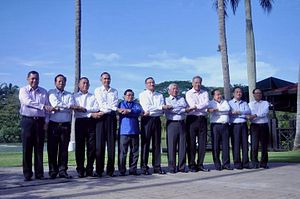Southeast Asian defense ministers agreed Tuesday to establish a hotline enabling them to communicate quickly and securely in a crisis situation on the sidelines of a regional retreat in Malaysia.
Malaysian defense minister Hishammuddin Hussein told a press conference following the ASEAN Defense Ministers’ Meeting (ADMM) retreat in Kuala Lumpur that he and his nine Southeast Asian counterparts had witnessed a signing ceremony for the so-called direct communication link (DCL) initiative which would help with confidence-building and rapid response during crises, thereby preventing unintended incidents in the high seas.
“The DCL aims to build confidence and trust and promote rapid response cooperation in times of emergency,” Hishammuddin said according to Malaysia’s national news agency Bernama. “Our biggest concern is unintended accidents and unintentional incidents in the high seas,” he added.
The hotline proposal was initially broached by Brunei’s Sultan Hassanal Bolkiah during Brunei’s chairmanship of ASEAN in 2013 and was subsequently taken up under the framework of the ASEAN Defense Ministers’ Meeting. The purpose of the DCL, Brunei’s defense ministry explained last year, was to provide a means by which any two ASEAN defense ministers may communicate with each other to arrive at mutual decisions in handling crises – especially those in the maritime realm – to defuse misunderstandings, prevent escalation and promote rapid response.
Brunei is one of the four ASEAN claimants to the South China Sea disputes, with the other three being Malaysia, the Philippines and Vietnam.
The DCL signing comes amid a tense time in the South China Sea after a U.S. warship finally sailed within 12 nautical miles of one of China’s man-made islands in the South China Sea, a move American officials had signaled for months.
Asked about his response to the U.S. freedom of navigation operation during a press conference, Hishammuddin stressed the need for stability and unity among Southeast Asian states in order to prevent external actors from determining the region’s future.
“I don’t welcome anything that can disrupt the stability of the region,” he said according to The Star, a Malaysian newspaper. “This is our region. We cannot allow other parties to determine our future.” Hishammuddin also clarified that the South China Sea issue itself was not under the purview of the defense ministry and would be discussed by ASEAN foreign ministers during the 27th ASEAN Summit held from November 18 to 22.
Hishamuddin said that the annual ADMM retreat saw discussions on other regional and international security issues such as terrorism, cyber security and maritime security. Later this week eight other nations – Australia, China, India, Japan, Korea, New Zealand, Russia and the United States – will join the 10 ASEAN countries for the ADMM-Plus meeting which meets once every two years.
































